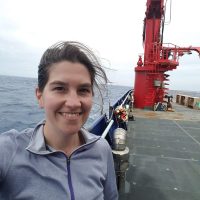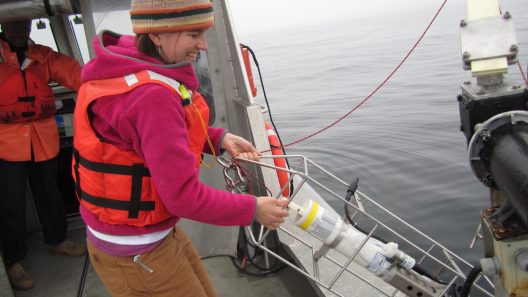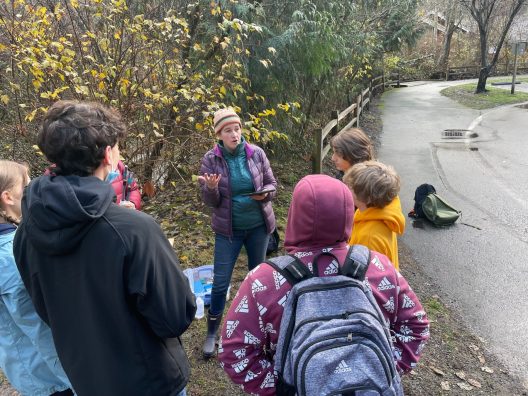Engaging a new generation of young scientists: SAFS Spotlight with Rosalind Echols
 We spoke with Rosalind Echols, who gained her PhD from the School of Oceanography in Spring 2022 and is now pursuing her Postdoctoral Scholar studies at SAFS, as part of our Spotlight Series. Our Spotlight Series showcases the researchers at SAFS, how they got here, and the impact their research is having on the wider world.
We spoke with Rosalind Echols, who gained her PhD from the School of Oceanography in Spring 2022 and is now pursuing her Postdoctoral Scholar studies at SAFS, as part of our Spotlight Series. Our Spotlight Series showcases the researchers at SAFS, how they got here, and the impact their research is having on the wider world.
Combining research with academic outreach, Rosalind pulls from her teaching background to engage a new generation of young scientists through the lens of “communities work together to learn”.
How did you get into your research field?
Very circuitously! I grew up in Seattle and was extremely fortunate to get to attend some UW Oceanography public lectures as a kid, so I knew both from personal experience and those events that the ocean was extremely cool. I have always loved beaches, tide pools, swimming, and being on boats, and idolized my older brother who pursued a career path in biology. However, I ended up pursuing an undergraduate degree in mechanical and aerospace engineering.
My senior year, I took an introductory oceanography class and got to see how a lot of what I had learned in my engineering courses was also relevant for oceanography. I considered going to grad school immediately, but ultimately decided to go into teaching instead and spent 9 years teaching in the School District of Philadelphia, including 7 years at the Science Leadership Academy. After participating in a NOAA Teacher at Sea Research cruise, I decided that I missed doing research and applied to grad school.
Tell us about your oceanography research at SAFS
I got my PhD last spring from the School of Oceanography at UW. My dissertation ultimately focused on two different scenarios in which upper ocean heating is strongly influenced by the structure of the upper ocean. The first was ocean regions that have a strong freshwater signature relative to the rest of the ocean, and the second was areas with varying concentrations of phytoplankton.
I tackled all of this primarily from the physics side, but one of the huge benefits of being in an interdisciplinary program and being part of the College of the Environment more broadly, is that I was exposed to a lot of other areas of research, including friends and peers doing research in ocean acidification.
My move to SAFS for this Postdoctoral position has involved a huge shift in terms of research focus, and I’ve been learning a lot about shellfish in the process, but it’s also really exciting to learn about things from the organism side as opposed to the ocean side.

What advice would you give to someone looking to join your particular field?
For me it has always been really important not to be afraid to change your mind. At various points in my life, including as an adult, I had a pretty strong idea of what I thought I wanted to do and then ended up changing my mind, and I think that’s okay. There are some caveats to that of course: I come from a relatively privileged background and have a very supportive partner, which eased the financial burden of starting grad school at age 32.
What’s been your favorite research field trip and why?
All of my actual PhD research used autonomous and remote sensing platforms, i.e. sitting in my office. I did volunteer on a cruise with some researchers from APL (James Girton, Eric Kunze, and John Mickett) to study the North Pacific Subtropical Gyre. This cruise not only allowed me to learn about lots of the ocean physics I’d been studying in classes in real life, but I also discovered the joys of the midnight-noon shift and met a long-lost cousin who also studies the ocean from the biology side. This cruise prompted a lot of thinking for me about the benefits of planning research expeditions with an explicit interdisciplinary lens.
What led you to be so involved with academic outreach?
When I was teaching, I had multiple experiences where someone wanted to do outreach in my classroom and just ended up coming to my class to show some demonstrations that were already part of my curriculum, but without the additional skill of having a strong background in teaching or actually knowing the students and what they needed and wanted.
When I started graduate school, I wanted to approach outreach in a different way.
Tell us about some of the projects you’re involved with in education and how it relates to your research?
I worked with a group of my Oceanography peers to redesign one of the introductory Oceanography lab courses to incorporate more of what we know about how students learn science. It was a really fun project. We met with all of the professors who had previously taught the course to understand what their goals and frustrations were, met with a professor from the UW School of Education who does research about science teaching and learning, and observed the class to understand the experience students were having.

The redesign of the course was really neat because students reported feeling very challenged but were also very positive about how much they thought they learned, which is an incredibly hard balance to strike when you move away from more traditional pedagogies.
I also helped design a workshop for teachers about the Physics of Climate change in collaboration with the Northwest Educational Service District, and facilitated both an in person and online version. It was really interesting to talk to teachers across a whole range of grades and subject matters about climate change and how they could incorporate learning about it into their classrooms from kindergarten to high school physics. One of the best parts, honestly, was getting to hear from teachers about what they needed, what they were doing, and facilitating opportunities for teachers to talk to one another about their ideas.
Shifting the narrative of science
It’s really important to me that we shift the narrative of science from “individual smart people have brilliant ideas” to “communities work together to learn”. Shifting away from lecture-based learning, supporting student voice in the classroom, and providing access to scientific research in ways that work for students (as opposed to what is easiest to produce) is really important if we are serious about developing a more inclusive science community.
What is your favorite part about academic outreach?
Students are amazing. I think the thing we miss when we don’t center students in our teaching and outreach is opportunities to hear what they are thinking, and they are always thinking! Every chance I get to talk to students, I hear interesting things. A huge part of my job currently is to try to understand what students already know and are already curious about and to incorporate that into connecting with the type of science that is happening at research labs at SAFS and elsewhere.